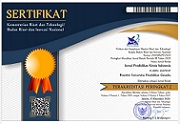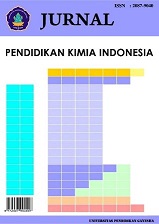The TPACK Profile of Chemistry Prospective Teachers in Microteaching Class, University of Bengkulu
DOI:
https://doi.org/10.23887/jpki.v7i1.49009Keywords:
Microteaching class, prospective chemistry teachersAbstract
The low knowledge of TPACK among senior semester students is the main reason for conducting this research. Whereas this knowledge supports them to become a teacher. When the profile is known, the researcher as well as the study program lecturer can prepare and improve the student’s TPACK. This research is descriptive research with a quantitative approach. The purpose of this study was to analyze the TPACK profile of prospective chemistry teacher in the microteaching class. The research subjects were students of the chemistry education study program, University of Bengkulu who took the course. The instrument used is the TPACK questionnaire. This TPACK questionnaire consists of aspects of TK, PK, CK, TPK, TCK, PCK, and TPACK. This questionnaire uses a Likert scale. The results of the study were then categorized into 5 categories in each aspect. This category is useful for grouping students. The results of this study stated that students of the chemistry education study program who took microteaching courses knew this TPACK in the good category. Almost all aspects have an average score in the good category, only 1 aspect has a sufficient average score.
References
Abbitt, J. T. (2011). Measuring technological pedagogical content knowledge in preservice teacher education: A review of current methods and instruments. Journal of Research on Technology in Education, 43(4), 281–300. https://doi.org/10.1080/15391523.2011.10782573. DOI: https://doi.org/10.1080/15391523.2011.10782573
Alhakiki, A., & Taufina, T. (2020). Pengaruh Quantum Teaching Kerangka TANDUR Terhadap Hasil Belajar Matematika di Sekolah Dasar. JURNAL BASICEDU, 4(3), 534–540. https://doi.org/10.31004/basicedu.v4i3.395. DOI: https://doi.org/10.31004/basicedu.v4i3.395
Astiningsih, A. D., & Partana, C. F. (2020). Using android media for chemistry learning construction of motivation and metacognition ability. International Journal of Instruction, 13(1), 279–294. https://doi.org/10.29333/iji.2020.13119a. DOI: https://doi.org/10.29333/iji.2020.13119a
Azwar, S. (2015). Penyusunan skala psikologi. Pustaka Pelajar.
Baran, E., Chuang, H. H., & Thompson, A. (2011). Tpack: An emerging research and development tool for teacher educators. Turkish Online Journal of Educational Technology, 10(4), 370–377.
Cavanagh, R. F., & Koehler, M. J. (2013). A turn toward specifying validity criteria in the measurement of Technological Pedagogical Content Knowledge (TPACK). Journal of Research on Technology in Education, 46(2), 129–148. https://doi.org/10.1080/15391523.2013.10782616. DOI: https://doi.org/10.1080/15391523.2013.10782616
Chai, C. S., Koh, J. H. L., & Tsai, C. C. (2013). A review of technological pedagogical content knowledge. Educational Technology and Society, 16(2), 31–51.
Fitriyana, N., Wiyarsi, A., Ikhsan, J., & Sugiyarto, K. H. (2020). Android-based-game and blended learning in chemistry: Effect on students’ self-efficacy and achievement. Cakrawala Pendidikan, 39(3), 507–521. https://doi.org/10.21831/cp.v39i3.28335. DOI: https://doi.org/10.21831/cp.v39i3.28335
Graham, C. R. (2011). Theoretical considerations for understanding technological pedagogical content knowledge (TPACK). Computers and Education, 57(3), 1953–1960. https://doi.org/10.1016/j.compedu.2011.04.010. DOI: https://doi.org/10.1016/j.compedu.2011.04.010
Herring, M. C., Koehler, M. J., & Mishra, P. (2016). Support for technology integration: Implications from and for the TPACK framework. In Handbook of Technological Pedagogical Content Knowledge (TPACK) for Educators: Second Edition (pp. 119–130). https://doi.org/10.4324/9781315771328. DOI: https://doi.org/10.4324/9781315771328
Karaca, F. (2015). An Investigation of Preservice Teachers’ Technological Pedagogical Content Knowledge Based on a Variety of Characteristics. International Journal of Higher Education, 4(4). https://doi.org/10.5430/ijhe.v4n4p128. DOI: https://doi.org/10.5430/ijhe.v4n4p128
Kereluik, K., Mishra, P., & Koehler, M. J. (2010). On learning to subvert signs : Literacy, technology and the tpack framework. The California Reader, 44(2), 12–18. http://punya.educ.msu.edu/publications/californiareader2010.pdf.
Koehler, M. J., Mishra, P., Akcaoglu, M., & Rosenberg, J. M. (2013). The Technological Pedagogical Content Knowledge Framework for Teachers and Teacher Educators. ICT Integrated Teacher Education Models, 1–8.
Koehler, M. J., Mishra, P., & Cain, W. (2013). What is Technological Pedagogical Content Knowledge (TPACK)? Journal of Education, 193(3), 13–19. https://doi.org/10.1177/002205741319300303. DOI: https://doi.org/10.1177/002205741319300303
Koehler, M. J., Shin, T. S., & Mishra, P. (2011). How do we measure TPACK? Let me count the ways. In Educational Technology, Teacher Knowledge, and Classroom Impact: A Research Handbook on Frameworks and Approaches (pp. 16–31). IGI Global. https://doi.org/10.4018/978-1-60960-750-0.ch002. DOI: https://doi.org/10.4018/978-1-60960-750-0.ch002
Kopcha, T. J., Ottenbreit-Leftwich, A., Jung, J., & Baser, D. (2014). Examining the TPACK framework through the convergent and discriminant validity of two measures. Computers and Education, 78, 87–96. https://doi.org/10.1016/j.compedu.2014.05.003. DOI: https://doi.org/10.1016/j.compedu.2014.05.003
Mishra, P., & Koehler, M. J. (2006). Technological Pedagogical Content Knowledge: A Framework for Teacher Knowledge. Teachers College Record, 108(6), 1017–1054. http://one2oneheights.pbworks.com/f/MISHRA_PUNYA.pdf. DOI: https://doi.org/10.1177/016146810610800610
Niess, M. L. (2011). Investigating TPACK: Knowledge growth in teaching with technology. Journal of Educational Computing Research, 44(3), 299–317. https://doi.org/10.2190/EC.44.3.c. DOI: https://doi.org/10.2190/EC.44.3.c
Öztürk, İ. H. (2011). Curriculum reform and teacher autonomy in turkey: the case of the history teachi̇ng. International Journal of Instruction, 4(2), 1694–609.
Polly, B. D., & Brantley-dias, L. (2009). TPACK-where do we go now. TechTrends, 53(5), 46–47. DOI: https://doi.org/10.1007/s11528-009-0324-4
Sahin, I. (2011). Development of survey of technological pedagogical and content knowledge (TPACK). Turkish Online Journal of Educational Technology, 10(1), 97–105.
Schmidt, D. A., Thompson, A. D., Koehler, M. J., & Shin, T. S. (2014). Technological Pedagogical Content Knowledge (TPACK): The Development and Validation of an Assessment Instrument for Preservice Teachers. Journal of Research on Technology in Education, 42(2), 123–149. DOI: https://doi.org/10.1080/15391523.2009.10782544
Shulman, L. S. (1986). Those who understand: knowledge growth in teaching. Educational Researcher, 15(2), 4–14. DOI: https://doi.org/10.3102/0013189X015002004
Tsovaltzi, D., Rummel, N., McLaren, B. M., Pinkwart, N., Scheuer, O., Harrer, A., & Braun, I. (2010). Extending a virtual chemistry laboratory with a collaboration script to promote conceptual learning. International Journal of Technology Enhanced Learning, 2(1), 91–110. www.inderscience.com/jhome DOI: https://doi.org/10.1504/IJTEL.2010.031262
Ulfa, A. M., Sugiyarto, K. H., & Ikhsan, J. (2017). The effect of the use of android-based application in learning together to improve students’ academic performance. Proceedings of the International Conference on Education, Mathematics and Science, 1847, 1–6. https://doi.org/10.1063/1.4983910. DOI: https://doi.org/10.1063/1.4983910
Wardani, S., Lindawati, L., & Kusuma, S. B. W. (2017). The development of inquiry by using android-system-based chemistry board game to improve learning outcome and critical thinking ability. Jurnal Pendidikan IPA Indonesia, 6(2), 196–205. https://doi.org/10.15294/jpii.v6i2.8360. DOI: https://doi.org/10.15294/jpii.v6i2.8360
Downloads
Published
How to Cite
Issue
Section
License
Copyright (c) 2023 febrian solikhin

This work is licensed under a Creative Commons Attribution-ShareAlike 4.0 International License.
Authors who publish with the Jurnal Pendidikan Kimia Indonesia agree to the following terms:
- Authors retain copyright and grant the journal the right of first publication with the work simultaneously licensed under a Creative Commons Attribution License (CC BY-SA 4.0) that allows others to share the work with an acknowledgment of the work's authorship and initial publication in this journal.
- Authors are able to enter into separate, additional contractual arrangements for the non-exclusive distribution of the journal's published version of the work (e.g., post it to an institutional repository or publish it in a book), with an acknowledgment of its initial publication in this journal.
- Authors are permitted and encouraged to post their work online (e.g., in institutional repositories or on their website) prior to and during the submission process, as it can lead to productive exchanges, as well as earlier and greater citation of published work. (See The Effect of Open Access)





